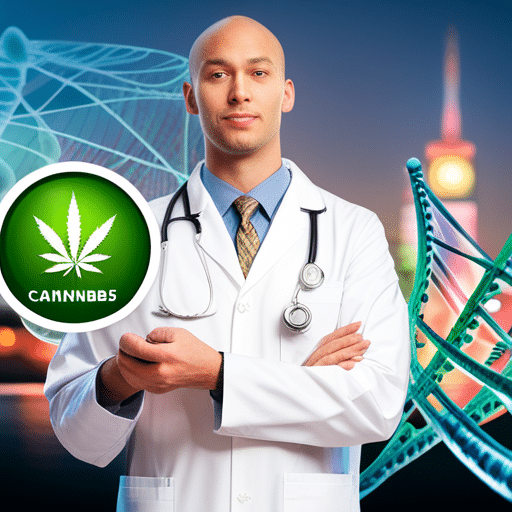Unlocking the potential of cannabinoid-based treatments in healthcare presents a unique opportunity for medical advancement. With ever-evolving research and an increased understanding of the therapeutic benefits, this field has garnered significant attention. Delmar, Maryland takes pride as one of Maryland’s leading specialists in this domain, providing expert cannabinoid care to patients requiring personalized treatment plans.
Breaking free from the confines of traditional medicine, Delmar’s dedicated clinicians delve deeply into the latest developments in medical marijuana research. This approach helps them form informed treatment strategies that consider individual patient conditions and requirements. Simultaneously, their commitment to overcoming the societal stigma surrounding cannabis use plays a crucial role in educating and advocating for patients under their care. Thereby fostering an environment that encourages acceptance and promotes future advancements within the realms of cannabis healthcare.
Understanding Cannabinoid-Based Treatments

The application spectrum of these plant-derived cannabinoids extends across diverse pathologies such as chronic pain management, epilepsy treatment, and mitigating neurodegenerative disorders symptoms among others. This broad therapeutic potential is primarily hinged on the interaction between cannabinoids and specific receptor sites within our biological systems. These interactions modulate physiological responses that help alleviate symptoms or directly combat disease progression. In addition to symptom management, research findings suggest that certain cannabinoids may possess intrinsic anti-inflammatory properties which further enhance their curative value. Nonetheless, it is imperative to remain cognizant of varying individual responses to cannabinoid-based treatments and continue extensive research efforts to fine-tune dosages and administration methods for optimized patient care outcomes.
Personalized Treatment Plans

– In-depth assessment:
– The initial step in developing personalized treatments involves a comprehensive analysis of each patient’s medical history and current health status. This rigorous evaluation aids clinicians in accurately determining dosage levels that will provide optimal therapeutic effects.
– Continuous monitoring:
– After implementing a tailored plan, continuous monitoring ensures that alterations can be promptly made if necessary. Regular check-ins allow healthcare professionals to assess progress, observe for any side effects, and make adjustments for enhanced outcomes.
The objective behind this meticulous methodology is not solely about symptom management or disease control; it goes beyond these immediate goals towards a broader horizon where patients experience an improved quality of life. It embodies the aspiration for liberation from debilitating symptoms, restoring autonomy over one’s health decisions while providing access to alternative forms of therapy like cannabinoids—viewed by many as an empowering shift in modern medicine.
Latest in Medical Marijuana Research

While these advancements signify a breakthrough in medicinal cannabis use, it is crucial to acknowledge there remains much to learn about its long-term effects and optimal administration methods. The ongoing commitment from researchers worldwide continues to address these knowledge gaps while simultaneously exploring further therapeutic potentials. For instance, recent studies are investigating whether specific cannabinoid profiles can target individual patient symptoms more effectively than general prescriptions. Such targeted treatments could lead to more personalized medicine within cannabinoid care – an exciting prospect with significant implications for patient’s quality of life and overall well-being.
Overcoming the Stigma Surrounding Medical Cannabis

A strategic approach can help provide clarity on this subject – one that combines scientific evidence with compelling narratives that resonate with individuals’ subconscious desire for liberation: freedom from pain, chronic illnesses, or debilitating conditions. One method could be through interactive educational campaigns highlighting the medicinal properties of cannabinoids. A simplified presentation can include:
| Pharmacological Benefits | Common Misconceptions | Reality |
|---|---|---|
| :———————–: | :——————–: | —— |
| Pain Relief | Addiction Prone | Regulated Medicinal Use Controls Dependency Risks |
| Reduced Inflammation | Deviant Behavior | Medical Cannabis Users Span Various Demographics |
| Anxiety & Stress Reduction | Harmful Side Effects | Side Effects are Comparable to or Less than Many Prescription Drugs |
| Improved Sleep Quality | Illegality Implies Danger | Legal Status Does Not Determine Therapeutic Value |
Informing the public about these facts could significantly challenge prevailing stigmas surrounding medical cannabis use and push forward its integration into mainstream healthcare practices. Moreover, acknowledging both its advantages and potential risks will ensure balanced discourse leading toward informed decision-making regarding cannabinoid care.
Patient Advocacy and Support

Incorporating both formal education sessions and interactive group discussions into their patient care strategies allows these specialist centers to address not just physical health but also mental well-being – an aspect often overlooked in traditional healthcare models. The following sub-lists delve deeper into their approach:
– Advocacy Training:
– Knowledge transfer: Regular workshops are conducted to provide up-to-date information on research findings related to medical cannabis.
– Legal guidance: Sessions focusing on the legal implications of using medical cannabis help patients navigate regulatory hurdles.
– Safe usage: Demonstrations on correct dosing methods ensure safe consumption while maximizing therapeutic benefits.
– Support Groups:
– Shared experiences: Group meetings allow individuals to share personal stories, fostering empathy and mutual understanding among members.
– Emotional support: These forums offer emotional backing during challenging times through shared experiences and professional counseling.
By engaging patients through advocacy training and support groups, cannabinoid care specialists enable them to make educated decisions regarding their treatment options. This holistic approach empowers patients with the knowledge they need while providing a supportive community that understands their journey toward achieving liberation from debilitating health conditions with medical cannabis.
The Future of Cannabis in Healthcare

The following table provides an overview of the current status and predicts the future direction of cannabis utilization in healthcare:
| Current Status | Predicted Future Direction | |
|---|---|---|
| Cannabis Legalization Progress | Numerous countries have decriminalized or legalized medical cannabis to some extent, yet its recreational use remains controversial and heavily regulated. | It is anticipated that further progress will be made regarding legal acceptance, potentially leading to more widespread adoption for both medical and recreational purposes. |
| Healthcare Policy Changes | Policies are being reformed to accommodate the availability of cannabinoid treatments under prescribed guidelines, although these vary widely among jurisdictions. | Ongoing advocacy efforts aim at harmonizing policies across different regions, thereby ensuring equitable access to cannabinoid care. |
| Cannabis Research & Development | Studies are increasingly focusing on isolating beneficial compounds from cannabis plants for targeted therapies; however, extensive research is still required for full comprehension. | With increased funding and progressive regulatory frameworks, it’s expected that more conclusive data will emerge regarding the efficacy and safety profiles of various cannabinoid-based treatments |
This evolution signifies a trend towards patient-centered care models where individuals can make informed decisions about their health based on empirical evidence derived from rigorous scientific investigations pertaining to cannabis-based therapeutics.
Frequently Asked Questions
What are the qualifications and experience of the medical specialists at Delmar, MD?
The specialists at Delmar, MD possess extensive specialist training in cannabinoid care. Their expertise is affirmed by numerous positive patient testimonials. They demonstrate a comprehensive understanding of the scientific complexities involved in this specialized field.
How are appointments scheduled with the medical specialists in Delmar, MD?
Appointments with the medical specialists in Delmar, MD are scheduled with considerable flexibility. Telehealth options are available, providing a convenient solution for individuals seeking expert cannabinoid care from a distance.
What are the costs associated with the treatments provided by the cannabinoid care specialists in Delmar, MD?
The costs associated with treatments from cannabinoid care specialists in Delmar, MD vary. These expenses may be influenced by factors such as insurance coverage and available payment methods. Further inquiry is recommended for precise information.
Are there any potential side effects or risks associated with cannabinoid treatments?
Cannabinoid Research Progress reveals potential side effects of Therapeutic Cannabinoid Applications, including dizziness, dry mouth, and mood changes. Risks may involve dependency or adverse reactions to other medications. Further studies are essential for comprehensive understanding.
Do the specialists at Delmar, MD provide care for out-of-state patients or only Maryland residents?
Telehealth options at Delmar, MD extend cannabinoid care to out-of-state patients, not limited to Maryland residents. However, insurance coverage may vary based on the patient’s location and specific health insurance policy.

